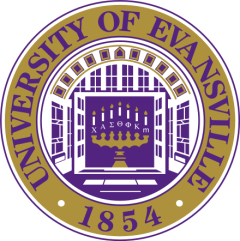Joe J. Wallace
It has been nearly 40 years since I walked proudly across the stage in Roberts Stadium to accept my Bachelor’s Degree in Mechanical Engineering from the University of Evansville. During that 40 years I have utilized that degree to gain acceptance into the Stanford University graduate school of engineering and enjoyed a broad range of technology related career opportunities and none of them would have been possible without my decision to earn a degree from the University of Evansville. My daughter Halley Wallace Eidson followed in my footsteps to become a UE graduate in philosophy and has enjoyed much success in her career in leading edge technology companies. My daughter-in-law Mary Williamson Wallace is a nursing graduate of UE and enjoys a career at the University of California San Diego. The University of Evansville is a family tradition that has served us well.
I was delighted to be named the third recipient of the Distinguished Young Alumnus award and to serve on the Alumni Board of Directors for six years followed by a three year stint as an Alumni Appointed member of the Board of Trustees. My memories of my undergraduate alma mater including my advisor and teachers are wonderful. At the ripe young age of 64, I would choose to do it all again.
I have watched the travails of the past few years that culminated in the recent Institutional Alignment with much interest. Change is often necessary at the institutional level and I truly hope to see UE find a business model that keeps it relevant and desirable. Colleges across the nation have suffered greatly at the hands of the COVID19 crisis but it was not COVID19 that caused the suffering. COVID19 simply accelerated the systemic weaknesses in the delivery of higher education in a way that demanded short term disruptions to attempt to repair long term issues.Â
Online higher education has made a college education possible for many people who for one reason or another did not elect to pursue an on campus educational experience. For some it was a financial necessity to embrace an online diploma and others did so because of family obligations. The reality today is that online education is growing, is cost effective, delivers value that is recognized in the workplace and is much less expensive than the full on campus experience. Online education has elevated the potential of students across the country. It has also created competition for the traditional four year institutions like the University of Evansville. Online education is not going away, so brick and mortar colleges will have to find a way to compete.Â
I currently serve on the Advancement Board of Directors for the California State University’s Palm Desert Campus. We are facing similar challenges. This year with the campus closed to instruction, our enrollment increased by 30% and it is all from students taking advantage of online offerings. Our next focus will be on putting degrees in place that are recognized in the private world as worthy of a salary that will cover the needs of a young growing family. Our next two offerings will open next fall and they are cybersecurity and entrepreneurship respectively. Relevance in the world of work at a price that makes sense is the mantra of survival for the campus of the future whether it is in Evansville, Indiana or Palm Desert, CA.Â
Elimination or pausing of degrees like Computer Engineering that was started when I was a student at UE by Dr. John Tooley, or Electrical Engineering and Software Engineering as the Institutional Alignment call for is blunting the Tri-State’s capacity to create the workforce of the future. These degrees command six figure starting salaries and the students who can handle the rigorous nature of these kinds of degrees can afford college even at today’s inflated prices. Some programs do not produce a job candidate with the skills to compete in the modern world. Elimination of those kinds of degrees is to be encouraged as they do not deliver the value to support their costs. We all know about highly educated people with multiple expensive degrees working for paltry wages. The institutions and guidance counselors that have eaten from the fatted calf of naïve young people seeking an education that has no value are culpable in the value problem.
As a student at UE, I was fortunate to have a co-op job in the engineering department of a coal mining company in Sturgis, Kentucky. I worked there in the summer and on weekends. According to my recent Social Security statement, I earned $12,542 as a co-op student in 1980. The tuition at UE in 1980 was roughly $3,000 per year so my internship provided sufficient funds for tuition, food and a modest apartment within walking distance of UE. I had student loans too and graduated with $5,000 in student debt which I ultimately paid off. My starting salary as an engineer at the RCA Corporation was $25,600 so the $83 payments were not a problem.
Fast forward to 2020 when the tuition at UE is now $38,686 per year and the median debt of a graduate is $27,000 in student loans plus any other debt that they incurred during their time on campus. To earn an equivalent sum as an intern today, one would need to be paid $161,733 for summers and weekends. Most CEOs do not earn that much, so what is a student to do? It is a conundrum that both UE and the nation need to solve and solve fast. When the cost of knowledge is not justified by the value of the knowledge in the workplace we risk seeing our brightest minds avail themselves of the opportunity to experience traditional education.Â
Many things have contributed to the exorbitant cost of college. Among those are cheap easy debt, federal grants that hide the true cost of instruction, recreational amenities that only a few students ever take advantage of, luxurious dorms as compared to years past, and a large collection of Vice Presidents of Things that have nothing to do with marketable skills. Our nation’s colleges have gotten fat, dumb and happy at the trough filled by the federal government. Online programs like the ones offered by Western Governor’s University, Southern New Hampshire University, Liberty University, and even Georgia Tech are eating the old traditional models alive and this is never going to stop.
There is a place for a traditional education and I certainly hope that the University of Evansville finds a way to maintain relevance and prosper. An Institutional Realignment is in order, but continuous improvement is always in order. Those who don’t improve and remain relevant whether in business or in the business of education are headed for extinction. I treasure my college experience and 40 years ago, UE was the best thing for me. I believe it is possible for that to happen if and only if, a rebirth of accountability for the product delivered (degrees) is instituted and the popular distractions of modern educational activities that have nothing to do with skill building are ceased. It is time to get back to the basics of preparing students for a successful life. Please move forward with common sense and value as the top propositions for the ivory towers that have gone astray.
One last thing. The last four degrees earned by members of my immediate family were all earned from online programs. None of the people who earned these degrees graduated with a cent of college debt and all have seen their careers accelerate for having these degrees. The future is now for those who accept accountability and add value.






On the mark, as usual.
Comments are closed.